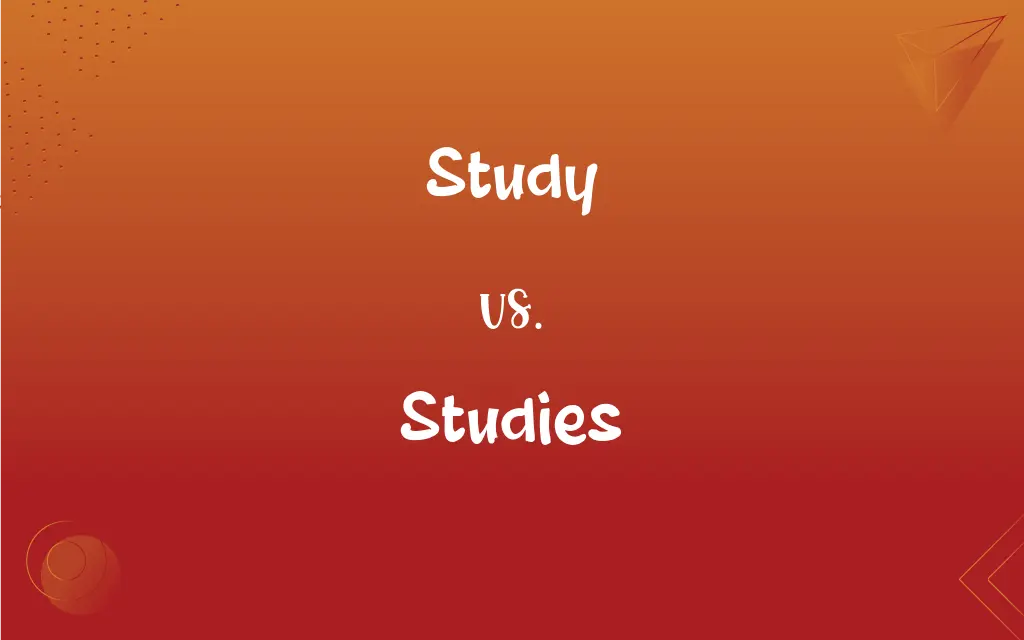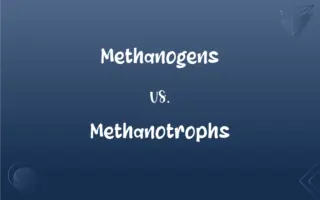Study vs. Studies: What's the Difference?
Edited by Aimie Carlson || By Harlon Moss || Published on February 28, 2024
"Study" refers to the act of learning or an academic investigation, while "studies" is its plural form, indicating multiple instances of learning or research activities.

Key Differences
The term "study" refers to the act of examining, learning, or analyzing a subject or concept. Conversely, "studies" implies multiple instances or areas of such examination or learning.
"Study" can denote a detailed investigation or research on a specific topic. "Studies," however, often refers to a range of scholarly activities or multiple research projects.
In an academic context, "study" might refer to focused learning in one subject, like a case study. "Studies" may represent a broader scope, encompassing various academic disciplines or courses.
"Study" can also imply a physical space dedicated to reading and writing. In contrast, "studies" does not typically refer to a physical space but rather to the activities or academic fields.
The verb form of "study" indicates the action of learning or researching, while "studies" used as a noun, signifies the outcomes or fields of these actions.
ADVERTISEMENT
Comparison Chart
Definition
Act of learning or investigation
Multiple instances of learning or research
Usage in Context
Single instance of academic work
Multiple academic works or fields
Grammatical Form
Singular noun or verb
Plural noun
Academic Reference
Refers to a specific area of focus
Encompasses various disciplines or courses
Physical Space Implication
Can refer to a room or area for study
Typically does not refer to a physical space
ADVERTISEMENT
Study and Studies Definitions
Study
An investigation or research on a particular subject.
His study on climate change won an award.
Studies
Multiple courses or subjects pursued in an academic setting.
His studies at the university covered a wide range of subjects.
Study
A room used for reading, writing, or academic work.
He spent hours in his study writing the report.
Studies
A collection of research papers or reports on a topic.
The professor published his studies in a prestigious journal.
Study
An act of learning or examining in detail.
She engaged in the study of classical languages.
Studies
Various academic or scholarly activities.
Her studies in biology and chemistry were extensive.
Study
A detailed drawing or painting made in preparation for a larger work.
The artist created a study before the final painting.
Studies
Research activities in various fields.
The institute conducts studies in environmental science.
Study
To devote time and attention to acquiring knowledge.
She plans to study chemistry in college.
Studies
Refers to the field of one's academic concentration.
Her studies focused on medieval literature.
Study
The effort to acquire knowledge, as by reading, observation, or research
The study of language has overturned many misconceptions.
Studies
The effort to acquire knowledge, as by reading, observation, or research
The study of language has overturned many misconceptions.
Studies
An act or effort made in the pursuit of knowledge
Applied himself to his studies.
FAQs
Is "studies" always plural?
Yes, "studies" is the plural form of "study," indicating more than one area of learning or research.
What is a study room?
A study room is a dedicated space for reading, writing, or academic work.
What does "study" mean?
"Study" refers to the act of examining, learning, or researching a specific subject.
Can "study" be used as a verb?
Yes, "study" can be a verb meaning to learn or examine something in detail.
Can "studies" refer to courses in college?
Yes, "studies" can refer to multiple courses or subjects pursued in a college or university.
Can "studies" refer to a physical space?
No, "studies" generally does not refer to a physical space but to academic or research activities.
What are "studies"?
"Studies" typically refers to multiple academic disciplines, research projects, or scholarly activities.
Is a case study a type of "study"?
Yes, a case study is a type of in-depth study focusing on a particular instance or example.
How is "study" used in an academic context?
In academics, "study" can refer to focused learning or research on a particular subject.
Can "studies" be interdisciplinary?
Yes, "studies" can be interdisciplinary, combining multiple academic disciplines.
How long do "studies" last in university?
The duration of studies in university varies but typically spans several years, depending on the degree.
Can "study" refer to artistic work?
Yes, in art, a "study" can refer to a preliminary drawing or painting made in preparation for a larger work.
Do "studies" always result in degrees or certificates?
Not always; studies can be informal or personal and may not always lead to formal qualifications.
What is an example of a "study" in research?
An example of a study in research is a detailed investigation into the effects of a new medication.
Can "studies" include online courses?
Yes, "studies" can include online courses, traditional classroom courses, or a combination of both.
Are "studies" only related to science?
No, "studies" can encompass a wide range of fields, including humanities, sciences, and arts.
What does "studying" involve?
"Studying" involves devoting time and attention to acquire knowledge or understanding of a subject.
Is "study" used in the context of space exploration?
Yes, "study" can be used in various fields, including space exploration, to denote research or investigation.
Does "study" imply a specific method of learning?
No, "study" does not imply a specific method but rather the general act of learning or investigating.
Are "studies" limited to academic institutions?
No, "studies" can occur in various settings, including academic institutions, research facilities, and even through self-directed learning outside formal educational environments.
About Author
Written by
Harlon MossHarlon is a seasoned quality moderator and accomplished content writer for Difference Wiki. An alumnus of the prestigious University of California, he earned his degree in Computer Science. Leveraging his academic background, Harlon brings a meticulous and informed perspective to his work, ensuring content accuracy and excellence.
Edited by
Aimie CarlsonAimie Carlson, holding a master's degree in English literature, is a fervent English language enthusiast. She lends her writing talents to Difference Wiki, a prominent website that specializes in comparisons, offering readers insightful analyses that both captivate and inform.































































